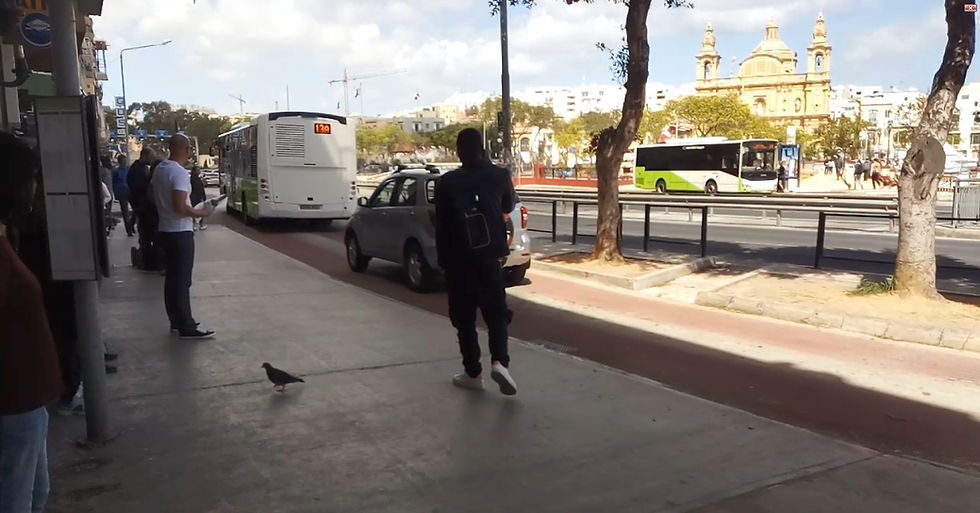My Unscheduled Bus Station Interview with an African Refugee
- Mike Omilusi, A Nigerian researcher and volunteer
- Mar 31, 2019
- 5 min read

"Kullegg" Bus stop in Msida, Malta. Photo R. Dang
The story of John Amadou (not real name) from Somalia sounds like tales by moonlight. It evokes a mixture of horror, sadness and determination. It also reinforces the endless struggle that has almost become a middle name for some African youths leaving the resource-rich continent for greener pastures in Europe and elsewhere.
I was on my way to keep an appointment with a South African volunteer in Hal Far (acommunity in the Maltese Island) when I met John at the Valletta bus terminus. Our paths crossed when I sought from him, the bus number and way to my destination after introducing myself as a Nigerian researcher. The next 42 minutes (9 at the bus station and 33 on the journey) afforded me another opportunity to explore the Mediterranean experience of these young Africans; that has been my pastime in the last few months.
The introductory question: are you a student here? sparked off the interview session with my emergency respondent. He did not have any particular European country in mind when he resolved to leave behind an unfulfilled youthful dream in Somalia.
The Story.
Raised by a single mother, his intention to further his studies after college became a mirage owing to a lack of funds; the same constraint accounting for cases of millions of out-of-school pupils in Sub-Saharan Africa. His frustration at home had found a common ground with the desperation of others when they embarked on the dangerous journey, facilitated by merchants of labour, to Libya- the notorious transit destination to Europe. At the border of Libya, he said they were sold to willing agents with whom they were to work for an unidentified period until they could secure their freedom. He worked on a plantation for six months from 7am to 7pm daily; sleeping in a manger with animals, and being fed mostly on bread and water. Yet, none of them on the plantation was paid a dime! “I met some guys who had been there over a year before I came”, he said.
In order to avoid being apprehended by security operatives along the road, he was hidden inside the car booth. “I almost suffocated inside the car booth because, for hours, when the heat was much, I could hardly breathe."
One day, it dawned on him that if no action was taken, his dream of getting to Europe might not be fulfilled. He had a small mobile phone with him like many others: “You are practically useless and dead without a phone”. Thus, he called one of the contacts in the main city (middlemen who usually facilitate migration from the sea). The apparently benevolent guy, according to him, sent a cab to pick him up. After series of communication with the contact man and the driver, the latter showed up the fourth day. Needless to say he had escaped from the plantation field into a distant bush as a temporary refuge while waiting for the cab. In order to avoid being apprehended by security operatives along the road, he was hidden inside the car booth. “I almost suffocated inside the car booth because, for hours, when the heat was much, I could hardly breathe. Thank God, I got to the city alive”.
The next phase of his sojourn began with this new contact man. Anticipating when the opportunity of the next available boat would come, he had an agreement with his boss to help save his money. Two months after hard labour, he was moved to a secret cocoon (that usually harbours finalists) near the sea- the last stage before his dreamland! There, over two hundred Africans- adult and children- were camped, another near hell experience because no one could predict the number of waiting days to spend. The meagre cash on him (his boss promised to pay the boat contractor) was exhausted within the first two weeks of arriving there. “I witnessed two departures the first month and I wasn’t on the list”. Each time the agents finished constructing the boat, they would bring the list of those paid for and march them out usually at mid-night when security operatives may not be around to arrest anyone. By this time, he knew his boss had not negotiated his exit from the terrible place and decided to call him. “His response was not reassuring for me enough so I decided to take my destiny in my own hands”. Suffice to say that many intending migrants to Europe get stuck in Libya spanning three to six years just as their tall dreams get dimmer every day. The second month when the agents came, John was approached to help lift the wooden boat near the sea and install the machine to power its movement. That was how he was able to scramble for a place that night on the rickety overloaded wooden boat. And the journey began with no captain!
It became another wobble experience when the machine failed, on the third day, leaving them to rely only on the waves for direction while trying to paddle along the Mediterranean sea!
They were only taught how to refill the machine with fuel having put on board five gallons (of fifty litres each). He took an active part in the boat manoeuvring as he could communicate both in French and English languages with other fate-bond adventurers. It became another wobble experience when the machine failed, on the third day, leaving them to rely only on the waves for direction while trying to paddle along the Mediterranean sea! At this point, there was no more drinkable water, no food to eat, no direction; the children began to wail, seeking succour from their equally helpless parents and all hopes appeared lost!
This was their predicament until the sixth night when they sighted a boat from afar and they began to wave for emergency relief. Within half an hour, they came close and interacted with the fishermen on board. “When they asked us if they should contact the emergency line in Libya, even though we just wanted to leave the sea and save our lives, we all said no!” They may have heard nasty stories of those who, in the past after failed attempts, found their way back to Libya where their safety was put at risk. The fishermen later contacted a rescue team in Europe and within 50 minutes, “we saw a rescue ship from Malta coming towards us”.

The Ħal Far Open Centre in Malta, replacing the former tents. Photo R. Dang
They were taken in two batches to Malta detention centre in November, 2018 pending when all paper formalities (for refugee/asylum status) would be finalised. We were both moving to the centre area when the unscheduled interview took place. John's case is said to be a mere child’s play when compared with the horrendous stories of many other Africans who perish in the sea while crossing to Europe. At least, when his refugee status is formalised, he could further his education at no cost to him. For now, he engages in menial jobs to save some money to complement the Containerized Housing Units accommodation and a paltry daily sustenance allowance being offered in the open “detention” camp. Perhaps, he has started receiving pressure back home for financial assistance, but I never asked him.










Comments